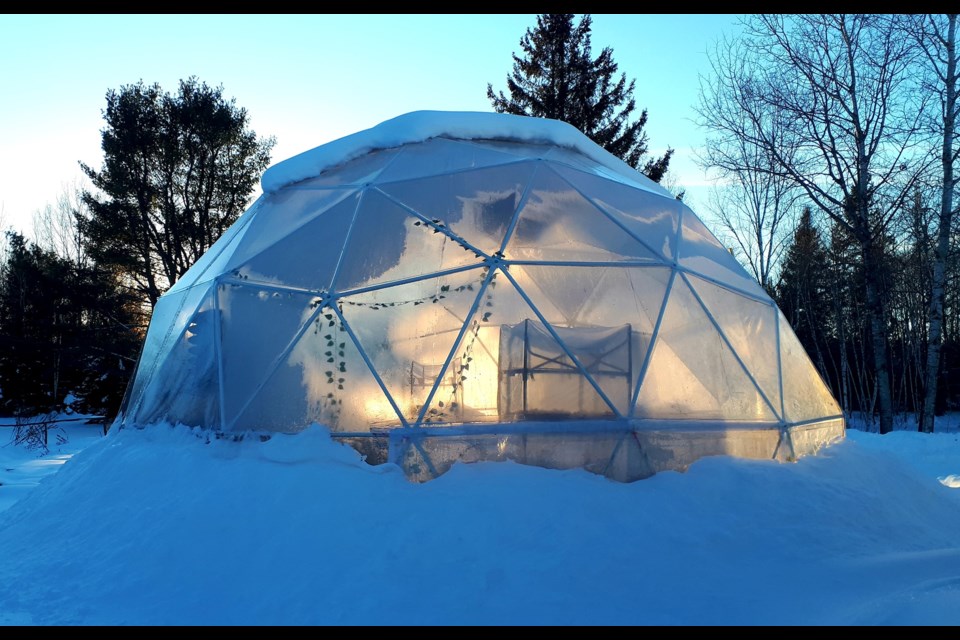“Jobs of the Future” is a series focusing on career paths, local job opportunities, programs, and tales of success that highlight North Bay's diverse job market.
---
“More people are looking for indigenous experiences; it’s a growing sector of the tourism industry. People are also looking for sustainable agriculture and this brings both of these together, so this really is a job of the future.”
That’s how Helen-Anne Embry describes what takes place at the Mattawa Eco Farm and Discovery Centre, which she owns and operates.
“We wanted to open it up to the public and create meaningful experiences and connect people to food and to help people build their skills and self-reliance,” says Embry.
“It’s a multi-generational approach and we wanted to make our tours and workshops fun for the whole family.”
She says some of the things they do on the tour are teaching people about sustainable agriculture, which includes companion planting and efficient design, seed saving, and teaching people how to cook with solar power.
“We have a geodesic greenhouse dome that we use to teach people to do solar cooking with. We talk about the design and how we run it. We can pull fresh produce out of there during January and February when it is -30 outside and we have no heat going into the dome, it's all about the design and using that passive solar power,” says Embry.
“We also teach solar cooking in a solar oven, which people can purchase for $30. You can really cook anything; I’ve been able to make a loaf of bread when it's -17 outside. As long as it’s a sunny or partially sunny day you can cook a meal. You can also dehydrate meat, fruit, and vegetables as well and sterilize water.”
But it’s not just using energy from the sun that can produce food. Embry says they show their guests how to set up an aquaponics system, which is a food production system that couples aquaculture with hydroponics.
“If you have a fish tank, you can grow some food using the fish you have inside that aquarium,” says Embry.
They are open for all four seasons and Embry says one of the biggest things people come to the farm for is their teaching on growing foods in a colder climate.
Embry says, “We can show you how to build a cold storage box which is like a mini greenhouse. If you have a little bit of space outside and you can grow food in it all year round.”
Embry says the basis for all of this lies in Indigenous culture.
“I am Métis and Mohawk and so I was always brought up in that culture of staying connected to the food and to the land,” she says.
“In 2018, I did a Ted Talk on sustainable food culture and green practice and how we can merge traditional methods with new green technologies as well. That Ted Talk actually caught the attention of the National Geographic Society and this past spring I ended up designing and running a program on cold weather and cold climate gardening for them. I was able to design 100 kits and teach people how they can farm and how they can be more secure and grow food in cold weather.”
Embry says she feels they are providing important information as food insecurities start to rise at a rapid pace.
“We’ve seen shortages in supplies and supplies being delayed and the cost of food rising and this is being able to give people more options so that they feel more food secure,” says Embry.
“We understand that food security has always been a huge issue for so many people and that seems to have increased over the last few years and we wanted to help people feel more secure and connect the younger generations to food sources as well; understanding how it grows and what they can do to contribute.”
Embry says they have a lot of people who come back multiple times to their farm.
“We’ve had many people come back because we teach during all four seasons and so it changes with the season with what’s available in terms of wild edibles,” says Embry.
“We’re also seeing a lot of children who are our biggest fans. They have so much fun learning and getting their hands in the dirt and being in the forest. We wanted to create this wholesome whole family experience and make this a key part of their education and connection to nature and farming.”
People can book their tours through 101 Experiences, or through the Facebook page or sending Embry an email at [email protected].
If you have a story idea for the Jobs of the Future Series, send Matt an email at [email protected]
